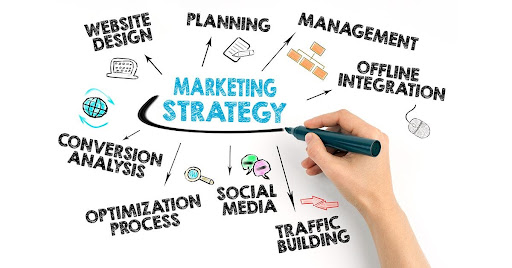Marketing is seldom a least liked task for lawyers. However, it is an essential evil for firms that want to keep their brand steady or increase the pace.
As a legal practitioner, you probably prefer to put your time into assisting clients, but you also know if you fail to fund enough time and resources in marketing, you may not have any clients to assist. Fortunately, it is feasible to attain results without breaking your bank or completely erasing productivity.
More than 33% of clients start their search for a lawyer online.
To expand your law firm to prosper and make more profit-making, you need to attract different clients and cultivate new business. Having a well-established law firm marketing strategy and course of action helps you grow law firms by ensuring your marketing efforts will be as effective as they can be.

Law firm marketing is the practice of attracting new clients to your law firm. A law marketing plan covers a mix of digital marketing, SEO, blogging, print, and digital ads. In addition, you can leverage law firm marketing technology to automate various tasks, consuming your time and energy.
The number one result on Google has an average click-through rate of 31.7%.
You get a custom approach to generating traffic that considers lawyers’ unique struggles attracting new clients with lawyer marketing. For instance, through SEO for lawyers, legal practitioners can target users within a territory, decreasing competition compared to targeting at a national level.
What Does a Law Firm Marketing Plan Include?
A comprehensive lawyer marketing plan will save you time, effort, and marketing budget in the long run. With a defined plan, you achieve your firm’s legal marketing operations that may otherwise fall through the cracks.

A successful law firm marketing plan includes three steps:
- Define your marketing goals
- Write down how you plan to achieve these goals
- Execute the plan
Define your Marketing Goals
It’s impossible to track and examine your success without setting quantifiable goals for your law firm marketing. You should set an objective and a time frame for your marketing goals, so you can reasonably measure how well you’ve achieved them in the future. For example:
- Setting a goal of gaining a certain number of new, active clients by the end of the quarter.
- You may want to set goals of increasing the pricing of some of your legal services to a certain number by the end of the year.
- While subjective goals like brand awareness are harder to measure, you can gauge your business’s performance by looking at your firm’s organic web traffic.
Planning Components
When creating your law firm’s marketing course of action, here’s what you should consider:
Overview: Your plan should outline the how and why of your law firm’s marketing with:
- A statement of purpose: What do you plan to accomplish by marketing your law firm?
- Your law firm marketing goals: Note specific SMART marketing goals for your firm.
Financial Statement: How much will your firm budget to invest in marketing?
Marketing Operations: What specific marketing tactics, campaigns, and activities will you take to achieve your goals? If you generate five new clients each month, your strategy to achieve that is through social media campaigns or PPC ads, or SEO.
Measurement strategies: How will you measure the success of your campaign? For each marketing listed, have a way to calculate success. For instance, for content marketing campaigns to be a 20% increase in organic search traffic to your law firm’s website.
Execution
When creating your marketing plan, assign individuals to roles. Also, consider outsourcing some marketing tasks to cut down on the cost when strategizing what you need to achieve for your legal marketing goals. For example, you can hire an expert to help with SEO, content creation, and more.
What Are The Components of a Law Firm’s Marketing Tactics?
There are many ways to market your law firm. Because of this, creating a legal marketing plan can feel overwhelming. Remember to keep your firm’s goals in mind and choose marketing tactics to integrate into your marketing plan.

Here are eight types of legal marketing tactics to consider your firm:
SEO
Today, 57% of people search for a lawyer online on their own. This means being easy to find online is one of the most critical marketing strategies for any legal practitioner. Lawyer SEO can help with that.
With lawyer SEO, you rank your law firm’s website in search engine result pages (like Google, Yahoo, Bing, and more) to drive more visitors to your website. Best SEO company for lawyers creates powerful marketing campaigns to ensure you receive a good volume of web visitors and potential clients looking at your content since the website will help you gain the clients you need.
Through Internal and external SEO, you can offer quality content to clients in the form of legal research, instructional videos, thought leadership blogs, and more. This not only increases your organic visibility but also draws in a lot of clients.
Local SEO
SEO is important for ensuring your law firm shows up in online searches, but organic searches aren’t the only way through which your clients find you-especially if you’re an SMB. So for easy navigation among clients to search you online, you optimize your website for local SERPs, aka local SEO.
An SEO agency for lawyers will boost your local SEO strategy by:
Setting up a Google My Business Page: Establishing a Google My Business account should be the first step in local search results. Your Google My Business page should include details like contact information, photos, and a link to your law firm website.
Ensure your website has local Keywords: To improve your law firm’s website ranking in local searches, add local keyword data to your website. For instance, if you’re a NewYork based criminal lawyer, target search words like “New York” on your firm website.
Consistent with NAP: Your Name, Address, and Phone data need to be in-tune where it appears online (like website, Facebook page, etc.) to optimize your local SEO.
Backlinking: Backlinks from other authority websites can elaborate your law firm website’s search rankings by creating your site’s authority online.
Get client reviews: Positive reviews are key to building your law firm’s reputation. Good, authentic customer reviews for your Google My business page sites like Yelp and Avvo are good for local SEO strategy.
Paid Ads
While SEO is an organic way to drive visitors to your law firm’s website, you can also employ a paid online marketing campaign to bring potential clients to your website.
Under PPC advertising, you can create an online advertising campaign where you pay a set amount each time an online visitor clicks on your ad. This can be an effective way to increase your website’s traffic- but it costs money for each click. Google ads campaigns are similar and could be an effective way to drive traffic for your law firm online.
Law Firm Website Optimization
The goal of SEO and PPC strategies is to drive potential traffic to your law firm’s website. Your law firm website is a powerful marketing tool in itself, and therefore it should be spotless. Optimizing your website allows:
Easy navigation and accessibility: Images should be properly sized, and content should be easy to read.
Mobile-Friendly: You want the targeted audience to navigate your website on any device, and the mobile-friendlessness of your website impacts its search ranking.
SEO Optimization: Your website content should be clear, keyword-optimized, and aligned with your law firm brand.
Social Media Marketing
If used strategically, social media can be a powerful marketing tool for your law firm, helping your legal firm:
- Outreach a large audience for your little to no financial investment; having a social media presence means a valuable opportunity to connect with people. Integrating platforms with paid advertisements can help you cost-effectively reach new clients.
- Establish brand authority by sharing quality content that organically boosts your connections with the community and showcases your position as an expert in the field. A strong social media presence on social media can help expose your firm to new networking opportunities with potential clients.
- Give your clients another way to find your firm. Using online social media in a professional context makes it easier for clients to find your law firm.
Content Marketing
Content marketing is the process of creating quality content related to your field of practice and sharing it online through multiple mediums. It is a marketing strategy that builds your brand and establishes expertise, offers value to the target audience, and drives more people to your website. Content marketing includes content like blog posts, podcasts, or infographics.
Today, thought leadership is a substantial part of content marketing. For example, to establish your firm as an industry leader or Subject matter expert for your target audience, your firm can create and share authoritative and educational content like blog posts, answers to questions in forums like Quora or videos.
Email Marketing
Email marketing for lawyers requires minimal effort if you use tools like Mailchimp. Sending out targeted and consistent advertising emails to the network can boost your brand awareness, amplify your firm’s expertise and give readers value.
Furthermore, it also is easy to quantify with email marketing platforms that offer analytics like how many people open your email. So, for example, sending out a law firm newsletter can effectively use an email marketing strategy.
How to Measure Your Law Firm Marketing Efforts?
Now that you’ve developed a niche law firm marketing plan and are implementing an impeccable lawyer marketing plan to create an effective strategy. If you plan to expand your law firm while maximizing your marketing budget, you need to measure your marketing key performance indicators.

To get a clear picture of your marketing strategy, here’s how you can quantify your plan:
Feedback
“How did you know about your firm?” can be a simple question; however, the answers can be extremely valuable. You could train your law firm’s customer care to ask and note the answer on the phone.
Analyze Website Analytics
If your law firm’s website is the doorway to your legal services, it is important to analyze its health now and then. To check the well-being of your website visibility, you should:
Check referring domains: Get data of clients before they come to your site can show where your marketing efforts are working or not? If yes, then how effective are they?
Bounce Rate: How long are visitors staying on your site? The bounce rate lets you know that your website can use some improvement to increase lead conversion.
Traffic: Measure the new traffic to your website, and compare it to the new traffic visiting your site for consultation. If there’s a large gap, data on traffic can reveal marketing areas where you’re lacking.
Extract Information of Your Clients
Your law firm’s intake software offers pristine insights for your marketing efforts. In addition, different tools like Clio Grow’s client insights software allow you to identify referral sources for different clients and customize reports on lead sources. This way, you can quickly and easily highlight where your marketing strategies have worked and where they haven’t been successful.
Now What?
To get new clients, you need people to know that you’re offering these services- thus is where your law firm marketing strategy comes in. When executing marketing according to a structured plan- and monitoring the results- you can help potential clients reach you and help your legal practice.
